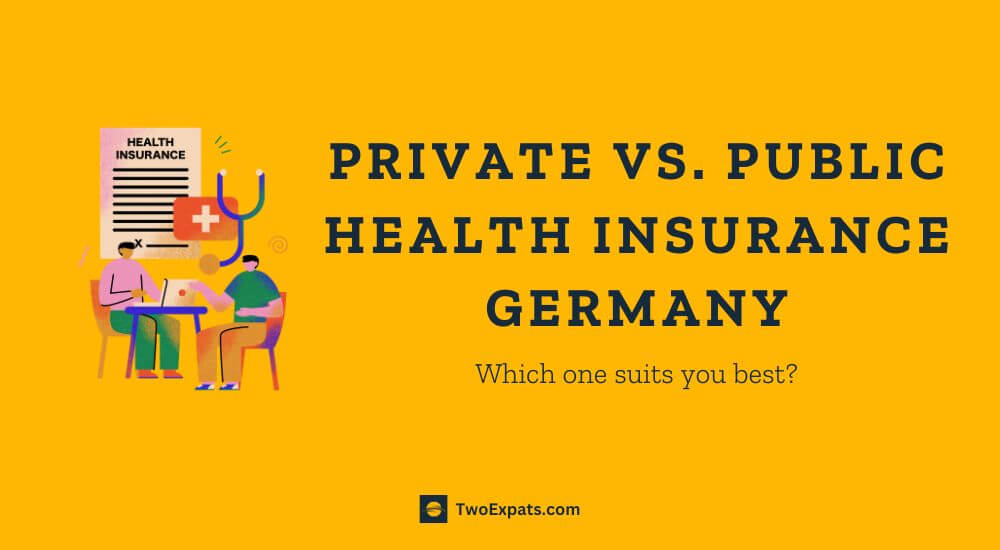You’re here because you want to figure out the best private health insurance in Germany for you, and maybe you’re lost between all the options.
And, let’s be honest, probably because insurance is an oh-so-boring topic and you want answers ASAP. We understand you.
But trust us, if there’s something about which you should make a very well-informed decision, it’s health insurance.
We know navigating health insurance outside the public system as a foreigner can be a real challenge, so we’re here to help you.
In this article, we’ll walk you through an analysis of a few private health insurance companies, namely Ottonova and Allianz, as well as private insurance brokers such as Feather, Getsafe, and KL For Expats.
In this comprehensive overview, we’re going to compare prices, coverage, and pros and cons, so you can feel confident making a decision about your private health insurance. Let’s go!
We cover in this article:
Comparison Table
Our comparisons are made for a generic persona: a 30-year-old person, with no children, employed in the private sector.
We are comparing the base plans from Ottonova, Allianz, and Feather.
This is the type of people that will benefit the most from private health insurance.
Public health insurance can be quite expensive for young professionals, so choosing a good private health insurance plan can help you save money while being covered for additional services you wouldn’t have with public insurance.
Ottonova | Allianz | Feather | |
Monthly Price | 249,86€ | 261,67€ | 236€ |
Outpatient medical treatment | 100% | 100% | 100% |
Specialist care | 100% reimbursement for a visit to your primary physician or when you use the Ottonova Concierge service; otherwise 80% | 100% First go to your family doctor, otherwise 80% | 100% after consulting your general practitioner or in case of an emergency; otherwise 75% when seeing a specialist without a referral from a general doctor. |
Medication | 100% | 100% | 80% (up to 4000€) - 100% (more than 4000€) |
Transportation | Yes | Yes | Yes |
General reimbursement for medical devices (hearing aids, wheelchairs, etc) | Yes | Yes | 80% (up to 4000€) - 100% (more than 4000€) |
Psychotherapy | 75% for a maximum of 50 sessions | 100% up to the 30th session | 70% (unlimited sessions) |
Hospital accommodations | Double room | Multi-bed room | Shared room |
Inpatient physician | Free choice of doctor (including head of department) | Doctor on duty | Doctor on duty |
Dental treatment | 100% | 100% | 100% |
Dentures/implants | 80% in the Ottonova dental network. 60% with all other dentists | 75% | 70% |
Vision (e.g. glasses, contact lenses) | Up to €150 in 3 years | Up to €150 | 150€ every 2 years |
Deductibles | 10% or 50% | 10% (up to 500€) or 30% (up to 1000€) or 3000€ | 0€ |
Alternative practitioner | 100% up to €500 per insurance year | up to 500 € | No |
Daily sickness allowance | As an add-on (max. 300€/day) | As an add-on (max. 275€/day) | *No information |
Worldwide protection | Yes, up to 6 months | Yes, up to 6 months | Yes, up to 1-month |
Which Private Health Insurance Is Right For You?
Private health insurance in Germany, also known as Private Krankenversicherung (PKV), is used by around 11% of German residents.
Not everyone has the option to choose between public or private insurance, so you have to be aware of the requirements.#
Most people are covered by public health insurance, but if you’re an employee making a gross income of more than 66,600€ a year, self-employed, an expat, a civil worker, or a student, you can choose to have private insurance or expat health insurance for your medical fees.
Unlike statutory health insurance, where the coverage is standard for everyone and includes nursing care insurance (and you don’t have coverage for more advanced treatments like major dental work, for example), with private health insurance, you have more freedom to customize the plan that best suits your needs.
Private health insurance covers everything from outpatient and hospital treatment, private doctors, and advanced medical care to dental treatments, visual aids, and alternative practitioners.
Private Health Insurance is a very personal matter, and the decision will depend on your specific situation and needs.
If you’re using public health insurance and think it’s time to make the change, we always suggest you take a very close look at the policies of health insurance you’re considering taking.
These are our recommendations based on our analysis.
Quick Summary
- Best Value for Money – Ottonova (Affordable premiums with a good range of coverage)
- Best Premium Plan – Allianz (High-performing premium plan with great coverage)
- Best for Young Professionals – Ottonova (A strong coverage with a fair price for young professionals)
- Best for Self-employed and freelancers – Allianz (Great starting prices for self-employed people)
- Best for Students – Ottonova (Specific premiums tailored to the needs of students)
- Best for Expats and tourists – Ottonova & Feather (both specialize in expat insurance, providing great plans with English-speaking support)
Private Health Insurance Companies Vs. Health Insurance Brokers
There’s often confusion about the difference between an insurance company and an insurance broker. Although they work together, they provide different types of services.
A health insurance company has its own insurance products and offers them directly to clients or indirectly through a broker.
In Germany, they are supervised by the Federal Financial Supervisory Authority.
A health insurance broker, on the other hand, serves as an intermediary between the private health insurance providers and the clients.
They are licensed to sell health insurance and work with several insurance providers, including public insurance companies. They help clients find the best option for them according to their specific needs.
The benefit of using an insurance broker is that they will give you independent advice on the best policy for you from a wide range of health insurance options.
They have in-depth knowledge and will compare policies to recommend the most suitable for your needs. That can save you time and money.
The benefit of going directly to a health insurance provider is that you won’t have extra costs (although the German government doesn’t allow brokers to charge any fee for advice) and having a direct relationship with a company can be helpful in a claims scenario.
Best Private Health Insurance Companies in Germany 2024
Now it’s time to take a look at a few great options for your private health insurance coverage.
Before that, you need to understand that, unlike public health insurance, the cost of private health insurance in Germany will depend on a few factors:
- Your age (typically the older you are, the higher the premium).
- Your health status (private health insurers can reject you if you have pre-existing conditions, and the better your health is, the lower the prices).
- The coverage level (the higher the benefits, the higher the costs).
- Deductibles (the higher the deductible, the lower your premium is going to be).
If you’re employed, you also need to have an annual salary of over 66,600€.
Important
For the purposes of this analysis, we are considering prices for a healthy, employed 30-year-old person with no children, choosing a deductible of 10%.
We’ll be showing you your final contribution. The employer pays half of the costs for private health insurance.
1. Ottonova
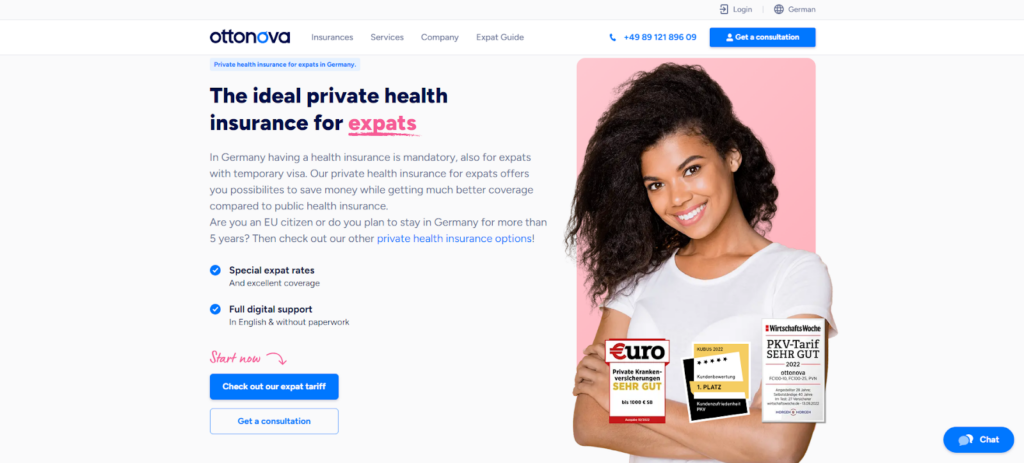
Ottonova is a private health insurance company founded in 2015 (licensed by Bafin since 2017), with a name inspired by the father of the German health insurance system, Otto von Bismarck.
This company is 100% digital, offering an innovative alternative to traditional insurance companies.
They offer three insurance plans: Premium Economy, Business Class, and First Class.
These prices show the contribution for an employed person, excluding the amount covered by the employer (required to pay half).
Ottonova Private Health Insurance | |||
Premium Economy | Business Class | First Class | |
Monthly Price | 249,86€ | 280,09€ | 299,42€ |
Outpatient medical treatment | 100% | 100% | 100% |
Specialist care | 100% reimbursement for a visit to your primary physician or when you use the Ottonova Concierge service; otherwise 80% | 100% | 100% |
Medication | 100% | 100% | 100% |
Transportation | Yes | Yes | Yes |
General reimbursement for medical devices (hearing aids, wheelchairs, etc) | Yes | Yes | Yes |
Psychotherapy | 75% for a maximum of 50 sessions | 90%for 25 sessions, 75% reimbursement per session from the 26th session | 90% for 50 sessions, 75% reimbursement per session from the 51st session onwards |
Hospital accommodations | Double room | Double room | Private room |
Inpatient physician | Free choice of doctor (including head doctor) | Free choice of doctor (including head doctor) | Free choice of doctor (including head doctor) |
Dental Care | 100% | 100% | 100% |
Dentures/implants | 80% in the Ottonova dental network. 60% with all other dentists | 90% in the Ottonova dental network. 80% with all other dentists | 100% in the Ottonova dental network. 90% with all other dentists |
Vision (e.g. glasses, contact lenses) | Up to €150 in 3 years | Up to €300 in 2 years | Up to €500 in 2 years |
Deductibles | 10% or 50% | 10% or 25% | 10% or 25% |
Alternative practitioner | 100% up to €500 per insurance year | 100% up to €1000 per insurance year | 100% up to €1500 per insurance year |
Daily sickness allowance | As an add-on (max. 300€/day) | As an add-on (max. 300€/day) | As an add-on (max. 300€/day) |
Worldwide protection | Yes, up to 6 months | Yes, up to 6 months | Yes, up to 6 months |
For students, Ottonova also offers three plans, “Student Smart”, “Student Protect” and “Student Free”, starting at around 123€.
And for self-employed people, the private health insurance provider offers plans starting at around 520€. Civil servants also have specific plans tailored to them.
Ottonova also offers expat health insurance starting at 167€, which can be beneficial for anyone planning to stay in Germany for less than 5 years.
Expat insurance is not available for people who can live in Germany without any type of visa (Non-EU citizens).
If you’re in the public health insurance scheme, you can also take on supplementary health insurance, such as dental or hospital insurance.
Pros
User-friendly digital application, where you can upload invoices and access medical records easily.
24/7 digital concierge service that can make appointments for you.
Fast reimbursement of medical bills.
English-speaking customer support.
Comprehensive coverage for all types of German residents, including expats.
Cons
Because Ottonova is a young company and not yet profitable, there’s uncertainty about how it’s going to behave long-term.
Their benefits for medical and vision aids are limited in terms of covered amounts.
2. Allianz
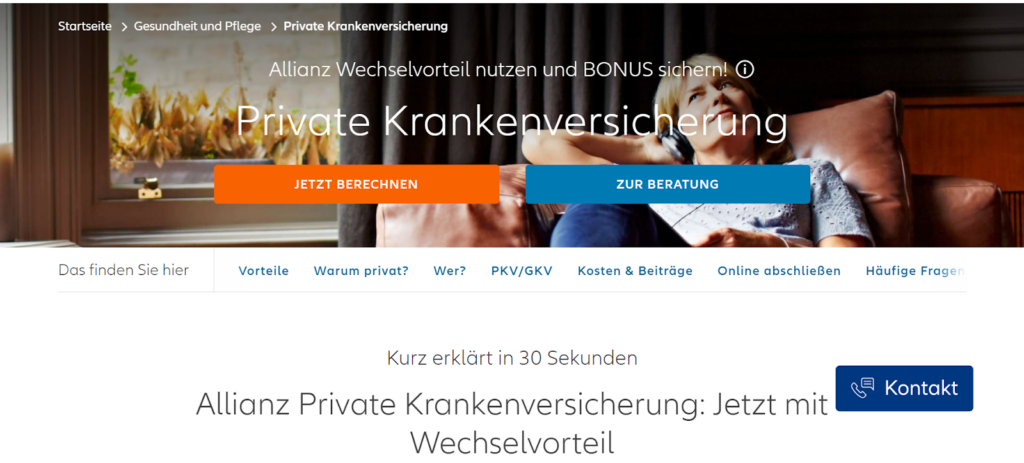
Allianz is a multinational German insurance provider founded in 1890, and based in Munich. It’s one of the biggest insurance providers in the world with a long history and strong financial stability.
They offer up to four plans for private health insurance. For a young employed person, you can have a compact package, two comfort packages, and a premium package.
Allianz Private Health Insurance | ||||
AktiMed 90 P Compact Package | AktiMed Plus 90 P Comfort Package | AktiMed Plus 90 Comfort Package | AktiMed Best 90 Premium Package | |
Monthly Price | 261,67€ | 299,41€ | 365,68€ | 366,87€ |
Outpatient medical treatment | 100% | 100% | 100% | 100% |
Specialist care | 100% First go to your family doctor, otherwise 80% | 100% First go to your family doctor, otherwise 80% | 100% Go straight to a specialist | 100% Go straight to a specialist |
Medication | 100% | 100% | 100% | 100% |
General reimbursement for medical devices (hearing aids, wheelchairs, etc) | Yes | Yes | Yes | Yes |
Psychotherapy | 100% up to the 30th session | 100% up to the 30th session | 100% up to the 30th session | 100% up to the 30th session |
Hospital accommodations | Multi-bed room | Double room | Double room | Private room |
Inpatient physician | Doctor on duty | head doctor | head doctor | head doctor |
Dental treatment | 100% | 100% | 100% | 100% |
Dentures/implants | 75% | 75% | 75% | 85% |
Vision (e.g. glasses, contact lenses) | Up to 150€ | Up to 250€ | Up to 250€ | Up to 400€ |
Deductibles | 10% (up to 500€) or 30% (up to 1000€) or 3000€ | 10% (up to 500€) or 30% (up to 1000€) or 3000€ | 10% (up to 500€) or 30% (up to 1000€) or 3000€ | 10% (up to 500€) or 30% (up to 1000€) or 3000€ |
Alternative practitioner | Up to 500 € | Up to 1000 € | Up to 1000 € | Unlimited |
Daily sickness allowance | As an add-on (max. 275€/day) | As an add-on (max. 275€/day) | As an add-on (max. 275€/day) | As an add-on (max. 275€/day) |
Worldwide protection | Yes, up to 6 months | Yes, up to 6 months | Yes, up to 6 months | Yes, up to 12 months |
Allianz offers a very wide coverage within their private health insurance plan. The insurance premiums from this health insurer start at 262€ for an employed person.
Compared with voluntary statutory health insurance, which has a high minimum contribution if you’re healthy, Allianz offers a reasonable price for a good performance policy.
Besides daily sick pay, this health insurance provider offers other useful components at an extra cost, such as:
- “Aktimed” change option (you can change your tariff later)
- A contribution relief in old age (for a small extra contribution now, you’ll have a lower price later on)
- A sports component (helpful if you’re doing sports regularly).
For the self-employed, they offer premiums starting at around 415€ a month. For students, Allianz doesn’t have a specific health insurance product.
However, Allianz offers a package called “OptionFlexiMed” which is aimed at customers who want to enter the world of private health insurance tariffs in the future.
The big advantage is that you secure your current state of health and later on you don’t have to do another health check.
Allianz also offers expat insurance, providing extensive coverage for people relocating to Germany or other countries.
Allianz has special insurance for doctors, one of the only in the market, offering particularly affordable contributions for young doctors during their training.
Pros
No claims bonus (premium refunds up to 50%).
Contribution relief in old age (a small additional monthly contribution will reduce your premium when you’re older).
Option to adjust or switch tariffs up to 3 times.
Great coverage and strong customer support.
Good plans for doctors.
Cons
Complex private health insurance product structure, which can be confusing for potential clients.
Can be expensive compared to other private health insurance policies.
Best Private Health Insurance Brokers in Germany 2024
Now let’s take a look at a few private health insurance brokers that are offering an intermediary service and tailoring the best private health insurance policy for your specific needs.
Although insurance brokers also work with public health insurers, they can be very helpful in finding the best private health insurance options case by case.
1. Feather
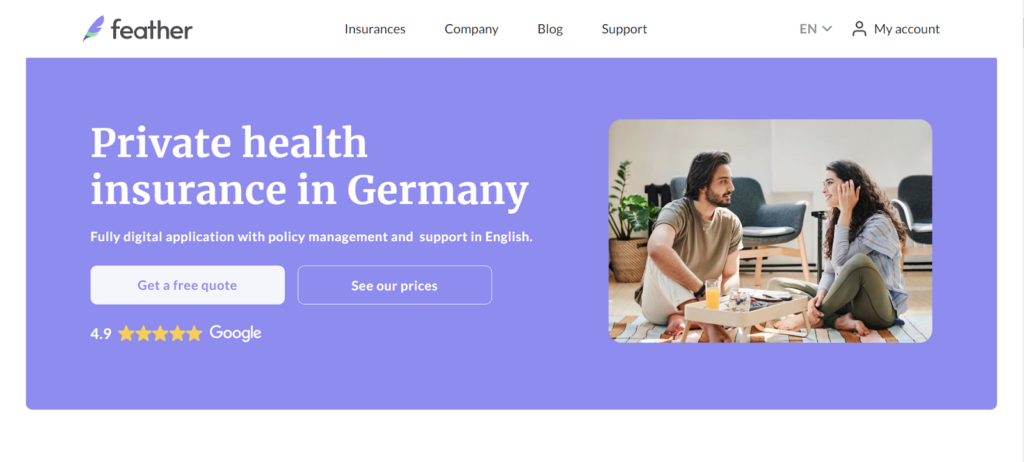
Feather is a 100% digital insurance broker, specializing in providing insurance services to expats in Germany.
The company was founded in 2018 by Rob Schumacher and Vincent Audoire after both struggled to navigate the insurance system.
Their private insurance plans are from partners like Hallesche and for public health insurance they partner with TK, Barmer, AOK, and DAK.
When it comes to private health insurance, Feather lets you calculate your prices and coverage just like a regular private insurer, providing you with a plan specific to your situation.
For a young professional with no children, Feather offers the following Private krankenversicherung tariffs:
Feather Private Health Insurance Broker | ||
| Standard Plan | Premium Plan |
Monthly Price | 236€ | 325€ |
Outpatient medical treatment | 100% | 100% |
Specialist care | 100% after consulting your general practitioner or in case of an emergency; otherwise, 75% when seeing a specialist without a referral from a general doctor. | 100% |
Medication | 80% (up to 4000€) - 100% (more than 4000€) | 100% |
Transportation | Yes | Yes |
General reimbursement for medical devices (hearing aids, wheelchairs, etc) | 80% (up to 4000€) - 100% (more than 4000€) | 100% |
Psychotherapy | 70% (unlimited sessions) | 90% (unlimited sessions) |
Hospital accommodations | Shared room | Private room |
Inpatient physician | Doctor on duty | Head doctor |
Dental treatment | 100% | 100% |
Dentures/implants | 70% | 90% |
Vision (e.g. glasses, contact lenses) | 150€ every 2 years | 450€ every 2 years |
Deductibles | 0€ | 0€ |
Alternative practitioner | No | 80% |
Daily sickness allowance | No information | No information |
Worldwide protection | Yes, up to 1 month | Yes, up to 1 month |
Feather also offers expat health insurance in Germany starting at 72€, and you can cancel monthly.
Expat insurance can be helpful when applying for a visa at the immigration office, as you may need to provide proof of having health insurance coverage.
The broker also offers travel insurance, only available for German residents, with a yearly cost of 18€.
Travel insurance is a good way to feel safe when traveling, but only covers medical emergencies. Usually, it can be bought online in your home country.
Their private insurance plans also include health protection for self-employed persons starting at 230€.
Feather will also help you if you have pre-existing medical conditions.
With statutory health insurance, people who have pre-existing conditions don’t have to worry about being accepted, but with a private health insurer, it can be more complicated.
Feather will make sure they find the best option for you.
Pros
Simple, easy-to-use digital platform.
Focus on customer satisfaction.
Initial free consultation.
Assistance in English.
Good support for expats.
Cons
As a broker dealing with several German insurers, it may lack the in-depth knowledge needed for more complex cases.
No information available about daily sickness allowance.
2. Getsafe
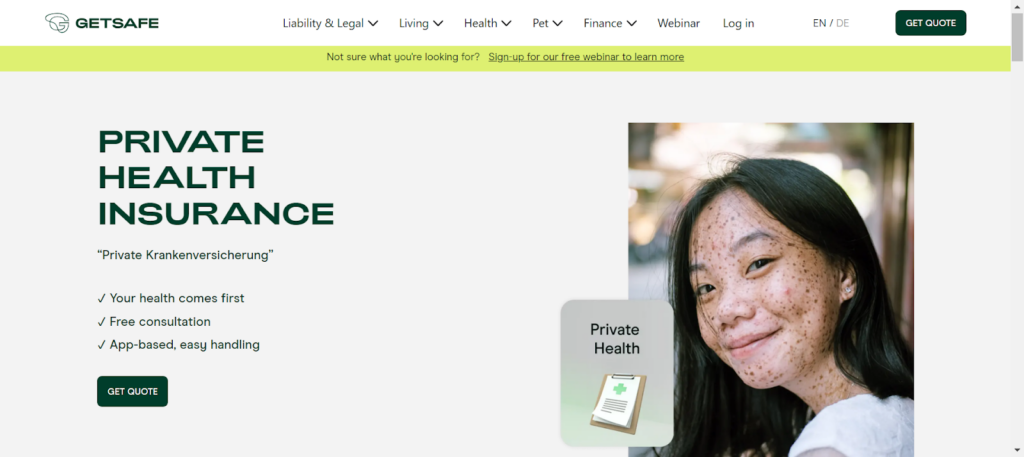
Getsafe is a 100% digital insurance company founded in 2015 by Christian Wiens and Marius Simon.
As an alternative to traditional companies, they offer a simple digital platform available in English.
Unlike Feather, Getsafe doesn’t provide an online estimation of your private health insurance costs and coverage, which makes it harder to evaluate the benefits and price-quality relationship.
You must request a quote by providing your phone number and email address.
Getsafe is known to have affordable prices, and they promise to provide comprehensive illness care by specialists in private clinics.
Their services are tailored to your needs, and you can choose whether your plan covers the free choice of doctor, comprehensive dental care, single room in a hospital, psychotherapy, and complementary alternative practitioners.
Getsafe handpicks and recommends the health insurance that best fits your needs. The monthly premium will depend on your specific circumstances and the coverage you want. They also offer expert advice, free of charge.
Pros
Personalized guidance.
English-speaking customer service.
App-based, digitized services.
Free consultation.
Cons
No online estimation of costs and coverage.
May lack personal touch because they are app-centered.
3. KLforExpats
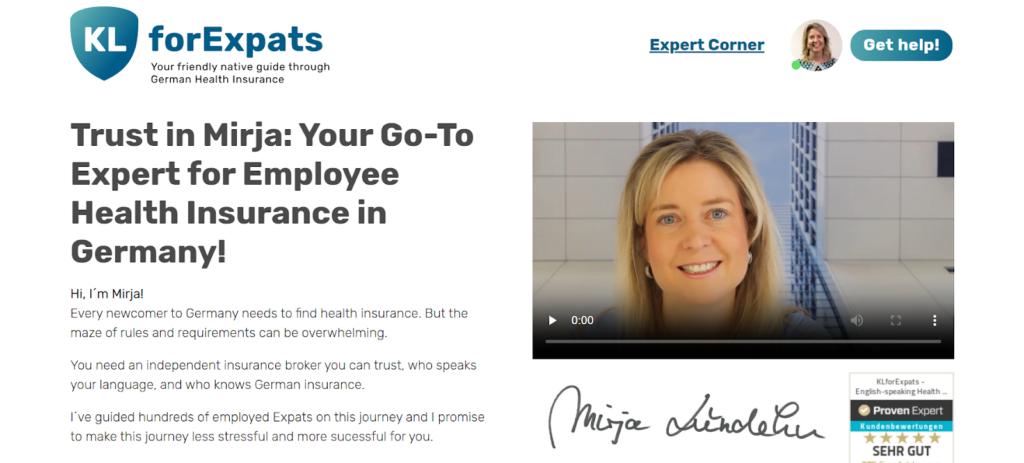
KLforExpats is a brand of the independent insurance brokerage KL Versicherungsservice GmbH based in Cologne.
They specialize in health insurance for expats, particularly those with a local employment contract.
The guidance is provided by the co-founder Mirja Lundehn, who will work closely with you to find the best health insurance plan for your specific case.
They also don’t provide cost estimates online, as you have to fill in a form first before they get back to you with more information.
The service is completely free, as they are paid through commissions from the insurance companies.
KLforExpats is known to have very positive reviews from clients who commend their expertise, personalized support, and quick process.
Pros
Tailored recommendations from experts.
English-speaking services.
Free of charge advice.
Specialized support for expats.
Cons
May not be your best option if you prefer digitized services.
You may feel pressured to choose insurance recommended by them.
Things To Keep In Mind While Choosing A Private Health Insurance Company in Germany
There are a few things that you should always keep in mind when choosing a private health insurance provider.
First, always understand the distinction between public health insurance and private insurance.
Private insurance premiums are only suitable for people who meet specific criteria, while public health insurance is mandatory for most people in Germany.
The process is also different, as with public health insurance you just need to provide your health insurance card. With private insurance, you usually have to pay upfront before being reimbursed.
Whether you are employed, self-employed, or a student, make sure the insurance policies you are considering can cover your specific situation.
Remember, unlike public health insurance, private insurance usually can’t cover you if you have a prior illness.
When choosing a policy, including expat health insurance, look at the range of coverage (make sure it includes at least some protection for dental care, psychotherapy, medical aids, and specialist care).
Also, look at the deductibles they offer. It’s always good to have some flexibility on the deduction percentages, as the higher the deductible, the lower your private premiums.
As an expat, it’s also always good to consider a company that offers English-speaking support, so you can communicate effectively with them and feel confident about their assistance.
FAQs
It will depend on factors such as age, health status, and coverage, so it can vary between 150€ to 1500€ a month.
A healthy young professional pays around 300€ to 500€.
Private health insurance is usually most beneficial when you are young, healthy, and with a high income.
If you plan to have children and retire in Germany, it might be more beneficial to stay with public insurance.
An insurance broker can be very helpful in giving you advice and recommending the best insurance for your specific needs. If you’re lost, get a consultation with one.
Conclusion
German health insurance is an unavoidable topic.
Expats need it to get a residence permit, international students need it to get a student visa, and simply everyone living in Germany is obliged to have it.
Finding the best option outside the public health system will depend on your specific circumstances and needs.
Hopefully, the insights from this article will give you some clarity.
Private health insurance is a very personal matter, so make sure you get well-informed and, if needed, talk with an independent broker for extra advice.


